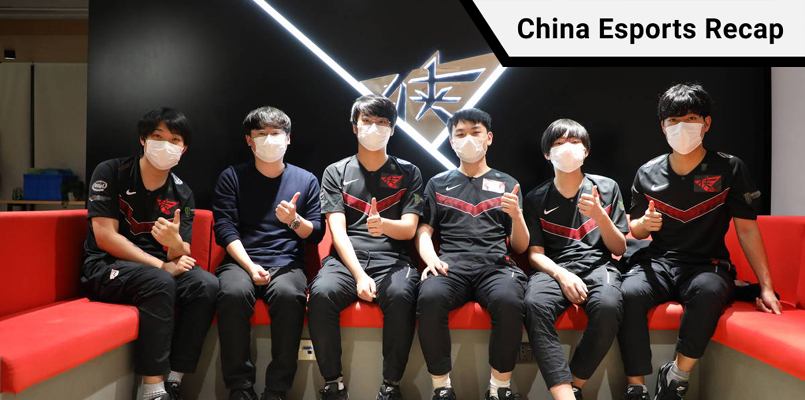The novel coronavirus (COVID-19) pandemic continues to accelerate around the world. The United States has surpassed China, becoming the country with the highest number of confirmed COVID-19 cases in the world. At the time of writing, the infection cases have passed 870K globally, and three countries surpassed 100K cases, including the U.S, Italy, and Spain.
China is among the first countries to lift its lockdown measures. As the infection cases of China surpassed 80K on March 2, the country just had a nearly 2.7K increase in cases in the whole month.
Though China’s esports industry has gradually recovered from the negative impact of COVID-19, there are still teams and players who lost out on opportunities in esports tournaments. For example, as we reported in our last China Recap, four players from Chinese Dota 2 team Team Aster were quarantined by the government until March 30. ESL decided to move the ESL One Los Angeles tournament online, and chose PSG.LGD to replace Team Aster.
Among the top stories in China’s esports industry: TJ Sports released its first stage penalty of Rogue Warriors player match-fixing case, fining the organization $420K, and the player 24 months global ban; esports organization Super Valiant partnered with Chinese MCN XROCK for streaming service; Bilibili Esports announced that its headquarter would be located in Hangzhou Future Sci-Tech City; and the United Nations signed a global partnership with Tencent Holdings.
Every week The Esports Observer presents the biggest esports business news in China including investments, acquisitions, sponsorships, and other major news from the region.
TJ Sports Releases First Stage of Match-Fixing Penalty, $420K Fine and 24-Month Global Ban

In our last China Recap, The Esports Observer reported that Chinese esports organization Rogue Warriors (RW) fired League of Legends player Wang “Weiyan” Xiang over his involvement in match-fixing incidents during the League of Legends Pro League (LPL) Spring Split.
On March 27 league operator TJ Sports released the first findings of the investigation and issued penalties. The League of Legends Union Discipline Management Team (LOL UDMT) confirmed that Wang had violated two regulations:
- Participate in illegal League of Legends betting activities, and receive improper benefits.
- Trying to manipulate match results by using unfair misconduct/behavior, and receiving improper benefits.
According to the League of Legends Global Penalty Index, Wang was given a 24-month global ban, with an expiration date of March 27, 2022, and is prohibited from streaming any League of Legends-related content on livestreaming platforms.
In addition, RW was given a ¥3M RMB ($420K) fine and a strong warning by TJ Sports. According to the deal between TJ Sports and esports organizations, every team has a responsibility to make sure all staff, including players, coaches, and team managers follow the LPL regulations.
It should be noted that the penalty was just in the first stage; TJ Sports also stated that it had not finished its investigations, and plans to investigate more people who broke the rule. According to the screen captures Wang posted on his social media, three other LPL teams Victory Five, eStar Gaming, and Dominus Esports (DMO) were potentially involved in this incident.
Super Valiant Partners With XROCK for Streaming Services

On March 30 Chinese esports organization Super Valiant (SV) signed a partnership deal with Chinese Multi-Channel Network (MCN) XROCK.
XROCK will provide streaming services, including promotion plans and streamer and fans management, to support SV players and audiences to have better streaming experiences on Chinese livestreaming platform Penguin Esports.
SV was founded in 2016, and has been recognized as one of the best performing CrossFire teams in China. The organization won the 2019 World Cyber Games (WCG) CrossFire event and also competes in Honor of Kings and Peacekeeper Elite.
Bilibili Esports, Hangzhou Spark Home Venue in Hangzhou Future Sci-Tech City

On March 28, Bilibili Esports, the esports division of Chinese video platform Bilibili, announced that the company signed a partnership deal with Hangzhou Future Sci-Tech City, to place its headquarters there and the home venue of Hangzhou Spark. The Hangzhou Future Sci-Tech City, an innovation complex, also includes the headquarters of Alibaba Group, as well as an elite Chinese university – Zhejiang University (QS Global Ranking #54).
In addition, according to Chinese esports outlet ECO, Bilibili Esports has taken the place of Banana Culture as the new Chinese production partner for Overwatch League, and will co-host the 2020 Overwatch Contenders competitions.
The UN Signs Global Partnership with Tencent

On March 31, Chinese conglomerate Tencent Holdings signed a global partnership with the United Nations (UN) to provide videoconferencing and digital dialogue tools for the international organization’s 75th anniversary (#UN75).
The UN will also run one-minute surveys, asking global citizens for solutions and opinions on major global challenges. These will be distributed on Tencent’s social networking, media, video, advertising, and gaming platforms.
According to Tencent’s Chinese announcement, the company outlined that the survey would be distributed through its esports mobile titles Honor of Kings, Peacekeeper Elite, PUBG MOBILE, and Arena of Valor. “We want to invite more diverse users to this survey,” Tencent stated in the announcement.
Other Esports Business News:

- On March 30, North American esports organization Team Liquid announced that the organization raised $77K from its streaming activity THE QUARATHON. The activity was to call on people to fight against the COVID-19, and players from all divisions streamed on Twitch and Chinese platform Huya.
- On March 30, esports organization TOP ESPORTS (TES) announced that the organization decided to withdraw from the 2020 League of Legends Development League (LDL) Spring Split, due to the COVID-19 pandemic, because four of its players lived in Wuhan.


